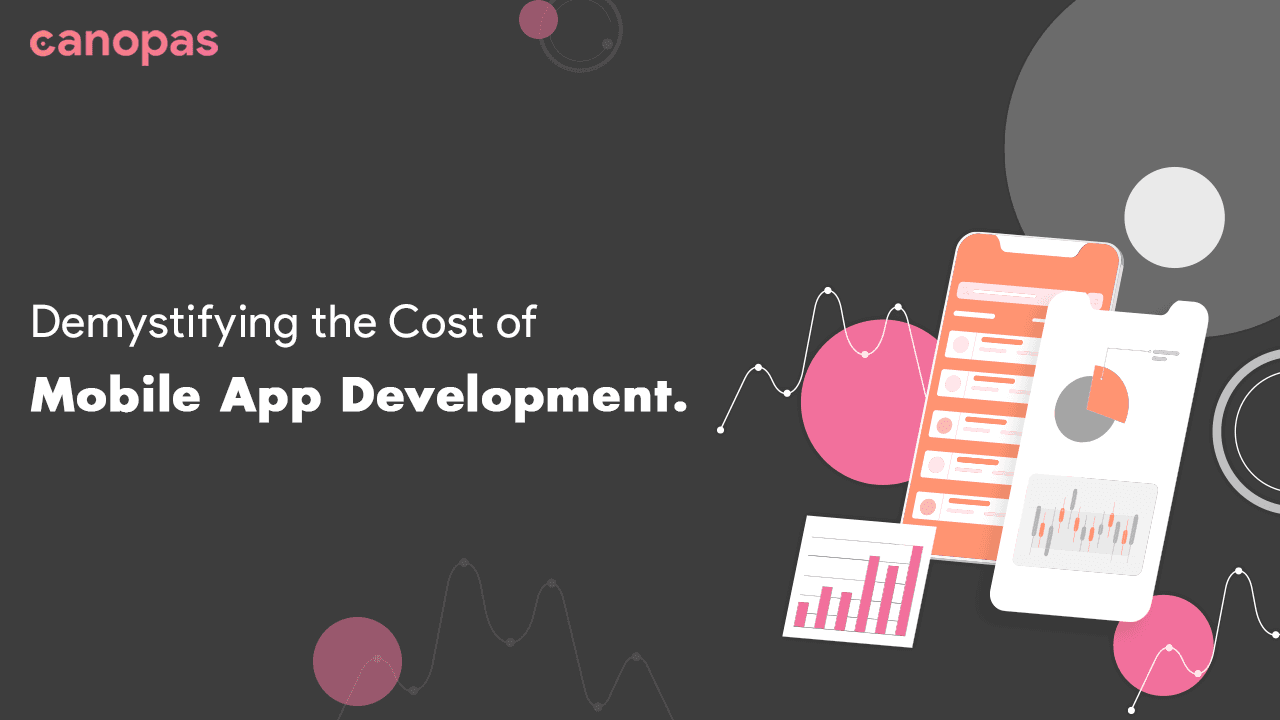
Demystifying the Cost of Mobile App Development
An Intro to Mobile App Development Costs
In today's digital world, having a mobile app is no longer a luxury – it's a necessity.
With billions of people across the globe glued to their smartphones, mobile apps have become a crucial channel for businesses to engage customers, drive sales, and bolster brand recognition.
But one question that often leaves entrepreneurs and small business owners scratching their heads is, "How much does it cost to develop a mobile app?"
If you've found yourself pondering this same question, you're not alone. And, you've landed at the right place!
The cost of mobile app development can seem like a complex and murky subject, wrapped in technical jargon and ambiguous pricing models. However, with the right insights, it can be simplified and understood, just like any other business expense.
In this blog post, we're going to peel back the curtain and demystify the cost of mobile app development. We'll explore the value proposition of mobile apps, break down the cost components, discuss influencing factors, and even dive into potential ROI.
So, whether you're a blossoming entrepreneur or a seasoned business owner, join us as we unravel the mystery of mobile app development costs!
The Value Proposition of Mobile Apps for Businesses
Let's explore why mobile apps are not just 'nice-to-have'; they are 'must-have' tools for businesses of all sizes.
1. Enhanced Customer Engagement: Mobile apps allow businesses to engage with customers in real-time, based on location and complete profile information. Apps like Starbucks have shown how personalized offers and rewards can improve customer engagement and loyalty.
2. Increased Sales: Mobile apps can significantly boost sales. According to Forbes, 85% of online shoppers prefer native e-commerce apps over e-commerce websites. They streamline the buying process, making it easier for customers to browse, decide, and checkout.
3. Greater Brand Recognition: A mobile app can augment your brand's visibility. It's like a blank billboard sign; you can make it stylish, informative, and functional - the more you cater to your customers' needs, the more they will appreciate you and become loyal to your brand.
4. Competitive Advantage: Despite the advantages, many small businesses still haven't embraced mobile apps. Developing an app could give you a significant edge over your competition.
5. Customer Insight: Mobile apps provide valuable data about customer preferences and behaviors, enabling businesses to make informed decisions and provide better products or services.
Now that we've established why mobile apps are valuable for businesses, it's important to understand that creating a successful app involves an investment. It's not just about the initial development costs, but also about maintaining and updating the app to meet customer needs and market trends.
The Cost Breakdown of Mobile App Development
Understanding the cost of mobile app development is like cracking a puzzle. Each piece contributes to the bigger picture.
Let's break it down into five key phases:
1. Ideation and Planning: The initial phase of app development is about defining the concept, target audience, and key features of the app. This phase also includes market research to identify competition and potential opportunities. The cost involved here is primarily time, which can translate into monetary terms if you're employing the expertise of consultants or a development agency.
2. Design: This phase involves creating the user interface (UI) and user experience (UX) design of the app. It's a critical step because the design can influence the app's usability and popularity. The cost depends on the complexity of the app and the number of screens it has.
3. Development: Here, the actual coding of the app takes place. The cost varies greatly based on the complexity of the app, the number of platforms it will be available on (iOS, Android, or both), and whether you're using native or cross-platform development.
4. Testing: Every app must go through rigorous testing to ensure it works properly and provides a good user experience. This phase involves identifying and fixing bugs, testing the app's functionality, performance, security, and more. The cost is generally included in the overall development cost but can increase if extensive testing is required.
5. Launch and Maintenance: Launching the app involves submitting it to the app stores and potentially marketing it to your target audience. After launch, maintenance costs include updates, new features, bug fixes, and meeting compliance changes.
Remember, these are broad phases, and the costs associated with each step can vary widely based on multiple factors. Let's delve into what these factors might be in the next section.
Factors Influencing the Cost of Mobile App Development
So, you've got the basic breakdown, but why do the costs vary so widely? This is where the complexity of mobile app development really comes into play.
Here are some key factors that can influence the cost:
1. Complexity of the App: A basic app with simple functionality will be significantly cheaper than a complex app with multiple features like user accounts, payment systems, or advanced functionalities like AR/VR, machine learning, etc.
2. Platform Selection: The choice of platform(s) also impacts the cost. Developing for one platform (iOS or Android) is cheaper than developing for both due to the extra time and resources required to adapt the app for each platform. However, You can also choose cross-platform like Flutter to develop both Android and iOS apps using one source code.
3. In-house vs. Outsourcing: Building an in-house team can be costlier due to recruitment, training, and overhead expenses. On the other hand, outsourcing to a development agency or freelancers can be a more cost-effective solution, but it's crucial to choose a reliable and experienced partner.
4. Location of the Development Team: The location of your development team can greatly influence the cost due to differences in hourly rates. For example, developers in North America tend to charge higher rates than those in Asia.
5. Post-Launch Support and Maintenance: The cost doesn't end once the app is launched. Ongoing support, maintenance, and updates are essential to keep the app running smoothly and keep up with technological changes and user expectations.
Each mobile app is unique, and the cost can vary based on your specific needs, goals, and market conditions. Understanding these factors can give you a better sense of what you're investing in and how you can control the costs without compromising the quality of your app.
Now that we've demystified the costs, let's explore the potential returns on this investment.
Understanding ROI for Mobile Apps
Investing in a mobile app is not just about counting the cost; it's also about measuring the returns.
As a business owner, you need to understand the concept of Return on Investment (ROI) to justify the expenditure.
Here's how you can measure the ROI of your mobile app:
1. Increased Sales: A well-designed app can directly increase sales by providing a seamless shopping experience, personalized offers, and push notifications about deals and discounts. You can measure the revenue generated through the app and compare it to your investment.
2. Improved Customer Engagement: An app offers numerous ways to engage customers – from in-app chats to feedback forms, surveys, and social media sharing. This enhanced engagement can lead to improved customer loyalty and increased sales over time.
3. Cost Savings: An app can also save costs in many areas like marketing and customer service. For example, push notifications can be a cheaper and more effective alternative to traditional advertising methods. Automated customer service features in the app can reduce the need for customer service staff.
4. Competitive Advantage: If having a mobile app gives you an edge over your competitors, this can also be seen as a return on your investment. While this might be difficult to quantify, it could translate into increased market share.
Calculating the exact ROI might require you to wait a while to gather enough data, but it's an essential part of understanding the value your app is providing.
But don't just take our word for it - let's look at some real-world examples in the next section.
Real-world Examples (Case Studies)
To truly grasp the potential of a well-developed mobile app, let's look at some real-world examples of businesses that have reaped significant benefits from their mobile app investments.
1. Starbucks: The Starbucks mobile app is a perfect example of how to leverage mobile technology to enhance customer experience and drive sales. The app, which allows customers to order, pay, and collect rewards, now accounts for nearly 30% of the company's transactions.
2. Headspace: This mindfulness app has shown how a great idea combined with a user-friendly app can create a successful business. With millions of users worldwide, Headspace has turned meditation into a lucrative business while helping people improve their mental health.
3. Zara: The fast-fashion giant, Zara, has used its app to bridge the gap between online and offline shopping. With features like a 'store mode' that enhances the in-store shopping experience and real-time inventory tracking, Zara's app has significantly contributed to its global success.
These examples show how diverse businesses have utilized mobile apps to drive growth and success. Your business could be the next success story!
In the final section, let's explore how you can embark on this journey of mobile app development.
Tips to Manage App Development Cost
While mobile app development is undeniably an investment, it's also critical to ensure you're maximizing your budget.
Here are some tips to effectively manage and potentially reduce the cost of your app development:
1. Define Your MVP Clearly: One of the best ways to manage costs is to start with a Minimum Viable Product (MVP). This means launching an app with essential features first, then progressively adding more based on user feedback. This approach not only helps manage development costs but also reduces the risk of investing heavily in features that users may not want or need.
2. Plan Ahead: Proper planning before starting the development process can save you a lot of money. Define your app's objectives, target audience, key features, and monetization strategy clearly. This can prevent costly changes or additions in the middle of the development process.
3. Prioritize Features: All features are not created equal. Some will be more integral to your app's functionality and user experience than others. By identifying and prioritizing these, you can allocate your budget more effectively and ensure the most important aspects of your app are developed first.
4. Choose the Right Development Approach: Whether it's a native, hybrid, or web app, the right development approach depends on your app's requirements and your budget. For instance, a hybrid approach can be more cost-effective if you want to launch on multiple platforms, but it may not offer the same performance or user experience as a native app.
5. Regular Communication with the Development Team: Regularly communicating with your development team can help identify issues early on, preventing costly fixes down the line. It also ensures that the project stays on track and within budget.
By keeping these tips in mind, you can effectively manage the cost of your app development project, ensuring you get the most value for your investment.
How much does it cost to develop a mobile app?
Many surveys indicate that basic app development starts at $5000 and it goes all the way over $1 million based on the complexity and features of the app. The best way is to prioritize a small set of features and start with the MVP development. As you acquire users, you can add new features and update based on data analytics and user feedback.
Developing a mobile app for your business can seem like a daunting task, filled with many uncertainties – particularly around cost.
However, as we've detailed in this post, with careful planning, a clear understanding of the process, and strategic decision-making, you can successfully navigate this journey.
A mobile app, while an investment, has the potential to yield substantial returns. From fostering customer engagement to driving sales and providing a competitive edge, the possibilities are immense.
If you're ready to embark on this exciting journey but need a guiding hand, our team at Canopas is here to help. With years of experience in creating bespoke mobile solutions for businesses, we ensure you not only get a top-quality app but also see the best return on your investment.
Interested in finding out more about how we can help you bring your mobile app vision to life?
Get in touch with us today. We're excited to help you transform your business through the power of mobile technology!








